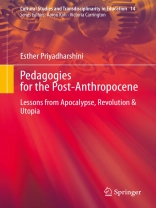This book draws on posthumanist critique and post qualitative approaches to research to examine the pedagogies offered by imaginaries of the future. Starting with the question of how education can be a process for imagining and desiring better futures that can shorten the Anthropocene, it speaks to concerns that are relevant to the fields of education, youth and futures studies. This book explores lessons from the imaginaries of apocalypse, revolution and utopia, drawing on research from youth(ful) perspectives in a context when the narrative of ‘youth despair’ about the future is becoming persistent. It investigates how the imaginary of ‘Apocalypse’ acts as a frame of intelligibility, a way of making sense of the monstrosities of the present and also instigates desires to act in different ways. Studying the School Climate Strikes of 2019 as ‘Revolution’ moves us away from the teleologies of capitalist consumption and endless growth to newer aesthetics. The strikes function asa public pedagogy that creates new publics that include life beyond the human. Finally, the book explores how the Utopias of Afrofuturist fiction provides us with a kind of ‘investable’ utopia because the starting point is in racial, economic and ecological injustice. If the Apocalypse teaches us to recognize what needs to go, and Revolution accepts that living with ‘less than’ is necessary, then this kind of Utopia shows us how becoming ‘more than’ human may be the future.
Table of Content
1. Introduction.- 2. Thinking-Making-Doing Futures Research.- 3. PART I: Apocalypse.- 4. Part II: Revolution.- 5. SECTION III: Utopia.- 6. Pedagogies for a Post-Anthropocene World.
About the author
Esther Priyadharshini is an Associate Professor in Education at the School of Education and Lifelong Learning, University of East Anglia. Her work is located in the intersection of education, youth and futures studies. It focuses on how education can be re-framed to respond to the challenges of the Anthropocene, and better support youth/children in the making of more desirable futures. She draws on tools and concepts from social theory, particularly feminist, postcolonial, new materialisms, and post humanist perspectives. She has an interest in experimental and innovative approaches to methodology (non-representational, speculative approaches and participatory perspectives).












